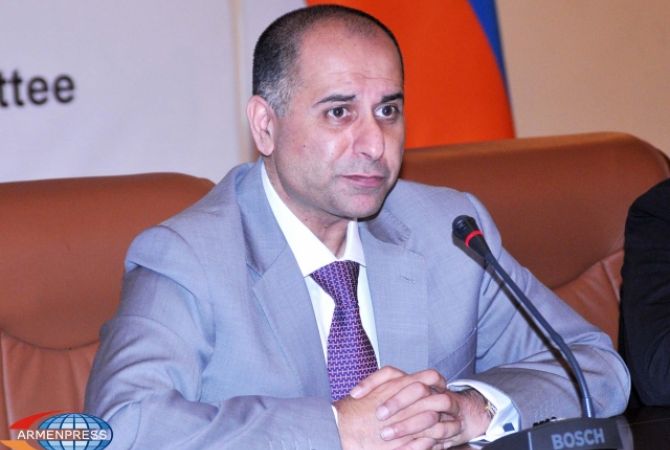EU supports creation of OSCE investigative mechanism in NK conflict zone - Sajjad Karim
 11:30, 30 January 2017
11:30, 30 January 2017YEREVAN, JANUARY 30, ARMENPRESS. Sajjad Karim – British political figure, Co-Chair of EU-Armenia Parliamentary Cooperation Committee, gave an interview to “Armenpress” over the existing issues, solution prospects in the Nagorno Karabakh conflict settlement process, as well as spoke about the April four-day war.
-Mr. Karim, first I would like you to comment a bit on the most painful event of the recent months, the April war. What do you think why now after so many years Azerbaijan restarted military operations? Was it expected?
-The European Parliament’s principled position on the matter, which we have been repeating many times over the years, is that the status quo in this conflict is unacceptable and unsustainable, precisely because it bears the constant risk of an escalation and of a resumption of armed hostilities. This is precisely why we have always spoken of a protracted conflict and not of a “frozen one”, and I think the April events just proved such fears were actually justified.
-The international community, including also You, made so many calls on this case, but there wasn't any official statement about who has started the actions. Don't you think it's important? I want to know your personal opinion.
-Look - especially in the fog of war it is extremely difficult to forge one’s personal opinion in an impartial manner. Even more so when we - as the EU - do not have direct access to the region, something we - as the European Parliament - have requested many times. This is why we certainly back the creation of an OSCE investigative mechanism, as we have called for and are continuing to call for.
-The Minsk Group Co-Chairs stated many times that the solution of this issue is political, it should be solved in a peaceful way. But during these years we see that the developments prove the contrary, the position of Azerbaijan during these years hasn't changed. What's your opinion about this?
-Our principled stance is that there can be no alternative to the peaceful resolution of the Nagorno-Karabakh conflict. Currently we have a situation which is a protracted conflict, with a no war / no peace ratio of variable intensity. Such a status quo is no permanent solution.
-Do you think the involvement of Nagorno Karabakh in the negotiation process could have some impact on the process?
-There is an ongoing negotiation process, which is currently underway, led by the OSCE Minsk Co-Chairs. It may not be perfect, but it is the only one we have and the only one to which both Azerbaijan and Armenia agree. At this stage, I doubt the wisdom of introducing such new elements in the equation.
-Mr. Karim, what will you say about the atrocities from Azerbaijani side toward Armenian soldiers and elderly people. They mutilated the bodies of our soldiers, beheaded them, cut the ears of elderly people and then gave the bodies to Armenian side. It's against all the norms and rules of war. Facts were collected on this and were sent it to the international institutions. What do you think about this and what should be done to bring the guilty side to responsibility?
-War crimes are an extremely serious issue to which we should all give political priority. This is precisely the reason the international community has created the International Criminal Court, to deal with crimes of genocide, crimes against humanity and war crimes. All of our EU Member States have ratified the Rome Statute, which creates this Court. As the European Parliament, we have constantly encouraged all countries to join us -and that includes both Azerbaijan and Armenia, which signed, but still has not ratified [Azerbaijan even didn’t sign the Rome Statute–ed.]. I can only repeat this call and hope Armenia will thus be able to lead by example.
-How would you comment on the recent Azerbaijani sabotage infiltration attempt on the Armenian-Azerbaijani border on December 29? The OSCE Minsk Group only 12 days later issued a statement by urging the sides to refrain from aggression and accusations. It seemed an attempt was made to put an equal sign between the sides, again refraining from addressed calls in case when Azerbaijan continues violating the ceasefire regime and also, according to the Minsk Group, refuses to implement the agreements reached in Vienna and St. Petersburg.
-The text of the Minsk Group states that “Baku and Yerevan continue to accuse each other of a December 29, 2016 attempted incursion on the Armenian-Azerbaijani border resulting in casualties.” I think this is factually correct, even though it is true it refrains from apportioning blame. The same declaration also calls the leaders of both countries to assist in the setting up of an OSCE investigative mechanism - which we fully support and is indeed long overdue.
-Mr. Karim, eventually how do you see the solution of the Karabakh conflict?
-My personal opinion is that, frankly, the keys to this conflict lie in Baku and Yerevan much more than elsewhere and that the EU, and the international community can only assist and mediate, but not solve the conflict on its own. The ceasefire violations -not to speak of last April- are ample demonstration that the status quo is not sustainable. A negotiated solution will necessarily involve a “give and take” from all sides.
Interview by Syuzi Muradyan




















